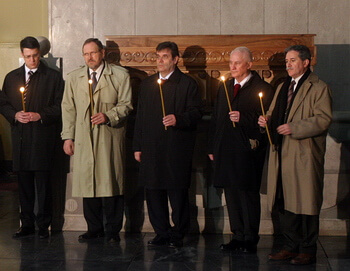During the preparations for another round of negotiations on Kosovo in Vienna, Slobodan Samardžić, an adviser to the then Prime Minister Vojislav Koštunica, briefly presented Vuk Drašković, then the head of diplomacy, with some ideas that he intends to present at the upcoming meeting. Draškovic listened carefully, and asked Samardžić – “Do you drink, professor?” “What’s the matter with you, Vuk, you know very well that I don’t drink”, the advisor was shocked. “Well, then this is terrible”, Minister Drašković was equally shocked by the ideas he heard from one of the most important creators of Serbian policy on Kosovo at the time.
Even after 13-14 years from this Vienna conversation, you can’t help but be shocked by the fact that the actors of the Kosovo negotiations at that time are still talking about the same, not even a little changed, autistic story about Kosovo. Here, of course, we do not mean Vuk Drašković. It is not even about Professor Samardžić, whose views on today’s negotiations on Kosovo are being paid full attention by the media for an unknown reason, probably respecting his competence as a former minister for Kosovo and Metohija. This is about all those people who in the recent past had all the power in their hands and a favorable environment to bring Serbia a solution for Kosovo that will not humiliate it and with which it will be able to continue honorably. Not only did they miss that opportunity, but even today they feel confident enough to speak with contempt about the current Serbian negotiating policy. Because, they would do it much better.
The Vienna negotiations on Kosovo in 2006 and 2007 were the last opportunity for Serbia to achieve maximum protection for the Serb community in Kosovo and for the status of Serbian cultural heritage in a more or less tolerable international environment. It was smoothly rejected by the then chief negotiators Koštunica and Tadić, and they found out that it was the last chance in a difficult way already in February 2008, when Kosovo declared independence. At that time, the famous Ahtisaari plan was on the table, a document that our statesmen flatly rejected, and immediately afterwards it became the backbone of the Kosovo Constitution. Today, many in Belgrade, including Professor Samardžić, point the finger at Pristina for not applying its own constitution and thus not protecting the Serb community enough, despite the fact that they rejected Ahtisaari’s plan a decade and a half ago as an act of supreme patriotism.
Without any sense of responsibility, they are talking about the fact that the President of Serbia, Vučić, will “hand over” Kosovo, any moment now, for eight years. Without any sense of shame, because not so long ago, they themselves were in a far more favorable position than Vučić to make concessions for Serbia and the Kosovo Serbs, but they unprofessionally managed to ruin those chances. The only active move they managed to pull in a sea of defensive and reactive tactics was to organize a rally “Kosovo is Serbia”, followed by the burning and demolition of the American and other embassies of Western countries in the center of Belgrade. It goes without saying, a “fantastic” counter-blow to the declaration of Kosovo’s independence, which is why we still do not have completely normalized relations with the United States. So, for the memory not to be completely black, let us remind ourselves that two girls from Batajnica treated themselves that day with sneakers from the broken window of a sports equipment store.
Serbia’s position in relation to Kosovo at that moment was nailed to the bottom, it was at zero, hopeless and left to the will of others. And that will made the international recognition of Kosovo, as well as its internal consolidation as an independent state, grow day by day, visible to the naked eye. The autistic official policy of Serbia also led to that point, which constantly knew what it would not do and insisted on it, without any idea of what it actually wants. When they asked the Albanians – what do you want, they answered – we want an independent and internationally recognized Kosovo. The leaders of Serbia answered the same question – we do not want an independent Kosovo. And what do you want? We want Kosovo not to be independent. Meaningless play with the supreme state interest, under the pretext of patriotism, cost Serbia a dramatic loss of both time and negotiating substance. Not to mention the steps that followed, like the movements of a battered boxer seconds before the knockout. Like the request of Tadić-Jeremić’s diplomacy to the UN International Court of Justice to declare itself on the validity of Kosovo’s declaration of independence, which is still celebrated in Pristina today as one of the most important events in strengthening of Kosovo’s independence. The self-confidence and seriousness with which the actors of these infamous events still complain that Vučić and his team are leading Serbia into a catastrophe, by “handing over” Kosovo is admirable. It should be immensely reckless, even rude, to accuse Vučić and his team of some “surrender” of Kosovo, and you know very well that they raised Serbia’s position from the complete hopelessness in which you left it to a level where no solution can be reached without Serbia. To a position where the people from Belgrade are respected as first-class and equal negotiators, whose arguments and demands are carefully incorporated into the construction of the future agreement. The Viennese negotiators could only dream of such treatment, but they are to blame for it. Instead of Serbia and Kosovo, at the moment when they were selected and paid for it, they chose myth, foggy past and salon patriotism as a screen for their state cowardice and ignorance. Fortunately, they will not be in Washington next week, and only the future will be discussed there.
